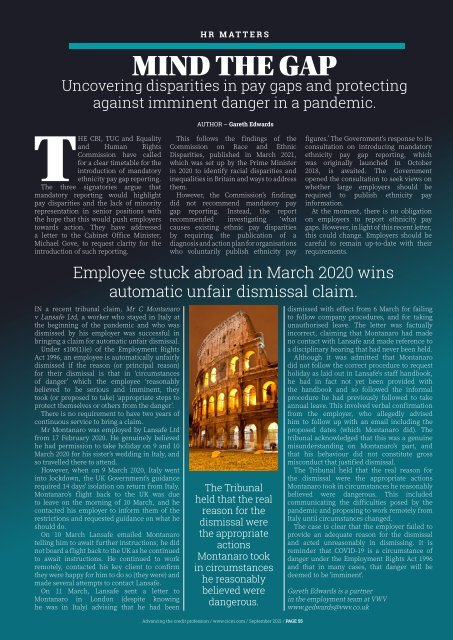CM September 2021
Create successful ePaper yourself
Turn your PDF publications into a flip-book with our unique Google optimized e-Paper software.
HR MATTERS<br />
MIND THE GAP<br />
Uncovering disparities in pay gaps and protecting<br />
against imminent danger in a pandemic.<br />
THE CBI, TUC and Equality<br />
and Human Rights<br />
Commission have called<br />
for a clear timetable for the<br />
introduction of mandatory<br />
ethnicity pay gap reporting.<br />
The three signatories argue that<br />
mandatory reporting would highlight<br />
pay disparities and the lack of minority<br />
representation in senior positions with<br />
the hope that this would push employers<br />
towards action. They have addressed<br />
a letter to the Cabinet Office Minister,<br />
Michael Gove, to request clarity for the<br />
introduction of such reporting.<br />
AUTHOR – Gareth Edwards<br />
This follows the findings of the<br />
Commission on Race and Ethnic<br />
Disparities, published in March <strong>2021</strong>,<br />
which was set up by the Prime Minister<br />
in 2020 to identify racial disparities and<br />
inequalities in Britain and ways to address<br />
them.<br />
However, the Commission’s findings<br />
did not recommend mandatory pay<br />
gap reporting. Instead, the report<br />
recommended investigating ‘what<br />
causes existing ethnic pay disparities<br />
by requiring the publication of a<br />
diagnosis and action plan for organisations<br />
who voluntarily publish ethnicity pay<br />
figures.’ The Government's response to its<br />
consultation on introducing mandatory<br />
ethnicity pay gap reporting, which<br />
was originally launched in October<br />
2018, is awaited. The Government<br />
opened the consultation to seek views on<br />
whether large employers should be<br />
required to publish ethnicity pay<br />
information.<br />
At the moment, there is no obligation<br />
on employers to report ethnicity pay<br />
gaps. However, in light of this recent letter,<br />
this could change. Employers should be<br />
careful to remain up-to-date with their<br />
requirements.<br />
Employee stuck abroad in March 2020 wins<br />
automatic unfair dismissal claim.<br />
IN a recent tribunal claim, Mr C Montanaro<br />
v Lansafe Ltd, a worker who stayed in Italy at<br />
the beginning of the pandemic and who was<br />
dismissed by his employer was successful in<br />
bringing a claim for automatic unfair dismissal.<br />
Under s100(1)(e) of the Employment Rights<br />
Act 1996, an employee is automatically unfairly<br />
dismissed if the reason (or principal reason)<br />
for their dismissal is that in ‘circumstances<br />
of danger’ which the employee ‘reasonably<br />
believed to be serious and imminent, they<br />
took (or proposed to take) ‘appropriate steps to<br />
protect themselves or others from the danger’.<br />
There is no requirement to have two years of<br />
continuous service to bring a claim.<br />
Mr Montanaro was employed by Lansafe Ltd<br />
from 17 February 2020. He genuinely believed<br />
he had permission to take holiday on 9 and 10<br />
March 2020 for his sister's wedding in Italy, and<br />
so travelled there to attend.<br />
However, when on 9 March 2020, Italy went<br />
into lockdown, the UK Government's guidance<br />
required 14 days' isolation on return from Italy.<br />
Montanaro's flight back to the UK was due<br />
to leave on the morning of 10 March, and he<br />
contacted his employer to inform them of the<br />
restrictions and requested guidance on what he<br />
should do.<br />
On 10 March Lansafe emailed Montanaro<br />
telling him to await further instructions; he did<br />
not board a flight back to the UK as he continued<br />
to await instructions. He continued to work<br />
remotely, contacted his key client to confirm<br />
they were happy for him to do so (they were) and<br />
made several attempts to contact Lansafe.<br />
On 11 March, Lansafe sent a letter to<br />
Montanaro in London (despite knowing<br />
he was in Italy) advising that he had been<br />
The Tribunal<br />
held that the real<br />
reason for the<br />
dismissal were<br />
the appropriate<br />
actions<br />
Montanaro took<br />
in circumstances<br />
he reasonably<br />
believed were<br />
dangerous.<br />
Advancing the credit profession / www.cicm.com / <strong>September</strong> <strong>2021</strong> / PAGE 55<br />
dismissed with effect from 6 March for failing<br />
to follow company procedures, and for taking<br />
unauthorised leave. The letter was factually<br />
incorrect, claiming that Montanaro had made<br />
no contact with Lansafe and made reference to<br />
a disciplinary hearing that had never been held.<br />
Although it was admitted that Montanaro<br />
did not follow the correct procedure to request<br />
holiday as laid out in Lansafe's staff handbook,<br />
he had in fact not yet been provided with<br />
the handbook and so followed the informal<br />
procedure he had previously followed to take<br />
annual leave. This involved verbal confirmation<br />
from the employer, who allegedly advised<br />
him to follow up with an email including the<br />
proposed dates (which Montanaro did). The<br />
tribunal acknowledged that this was a genuine<br />
misunderstanding on Montanaro's part, and<br />
that his behaviour did not constitute gross<br />
misconduct that justified dismissal.<br />
The Tribunal held that the real reason for<br />
the dismissal were the appropriate actions<br />
Montanaro took in circumstances he reasonably<br />
believed were dangerous. This included<br />
communicating the difficulties posed by the<br />
pandemic and proposing to work remotely from<br />
Italy until circumstances changed.<br />
The case is clear that the employer failed to<br />
provide an adequate reason for the dismissal<br />
and acted unreasonably in dismissing. It is<br />
reminder that COVID-19 is a circumstance of<br />
danger under the Employment Rights Act 1996<br />
and that in many cases, that danger will be<br />
deemed to be 'imminent'.<br />
Gareth Edwards is a partner<br />
in the employment team at VWV<br />
www.gedwards@vwv.co.uk


















